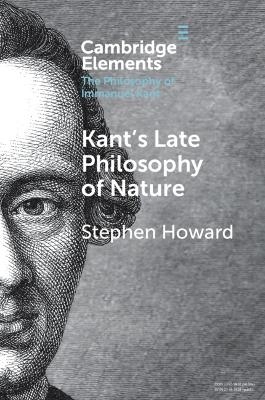
Kant's Late Philosophy of Nature
The Opus postumum
Seiten
2023
Cambridge University Press (Verlag)
978-1-009-01376-5 (ISBN)
Cambridge University Press (Verlag)
978-1-009-01376-5 (ISBN)
This Element outlines a framework that aims to combine the systematic ambition of early twentieth-century readings of Kant's Opus postumum with the rigour of more recent studies.
Kant's final drafts, known as his Opus postumum, attempt to make what he calls a 'transition from the metaphysical foundations of natural science to physics.' Interpreters broadly agree that in this project Kant seeks to connect the general a priori principles of natural science, as set out in the major critical works, to the specific results of empirical physics. Beyond this, however, basic interpretative issues remain controversial. This Element outlines a framework that aims to combine the systematic ambition of early twentieth-century readings with the rigor of more recent studies. The author argues that a question that has animated much recent scholarship – which 'gap' in Kant's previous philosophy does the Opus postumum seek to fill? – can be profitably set aside. In its place, renewed attention should be given to a crucial part of the manuscript, fascicles X/XI, and to the problematic 'arrival point' of the transition, namely, Kant's question: What is physics?
Kant's final drafts, known as his Opus postumum, attempt to make what he calls a 'transition from the metaphysical foundations of natural science to physics.' Interpreters broadly agree that in this project Kant seeks to connect the general a priori principles of natural science, as set out in the major critical works, to the specific results of empirical physics. Beyond this, however, basic interpretative issues remain controversial. This Element outlines a framework that aims to combine the systematic ambition of early twentieth-century readings with the rigor of more recent studies. The author argues that a question that has animated much recent scholarship – which 'gap' in Kant's previous philosophy does the Opus postumum seek to fill? – can be profitably set aside. In its place, renewed attention should be given to a crucial part of the manuscript, fascicles X/XI, and to the problematic 'arrival point' of the transition, namely, Kant's question: What is physics?
1. Introduction; 2. A Sketch of the Reception History; 3. 'Gap' or Transition Problem?; 4. The Form of the Transition Problem; 5. What is Physics?; 6. Conclusion; Appendix: How to Read the Opus postumum; References.
| Erscheinungsdatum | 20.03.2023 |
|---|---|
| Reihe/Serie | Elements in the Philosophy of Immanuel Kant |
| Zusatzinfo | Worked examples or Exercises |
| Verlagsort | Cambridge |
| Sprache | englisch |
| Maße | 152 x 229 mm |
| Gewicht | 127 g |
| Themenwelt | Geisteswissenschaften ► Philosophie ► Geschichte der Philosophie |
| Geisteswissenschaften ► Philosophie ► Philosophie der Neuzeit | |
| ISBN-10 | 1-009-01376-9 / 1009013769 |
| ISBN-13 | 978-1-009-01376-5 / 9781009013765 |
| Zustand | Neuware |
| Informationen gemäß Produktsicherheitsverordnung (GPSR) | |
| Haben Sie eine Frage zum Produkt? |
Mehr entdecken
aus dem Bereich
aus dem Bereich
die kolonialen Wurzeln der französischen Theorie
Buch | Hardcover (2024)
Matthes & Seitz Berlin (Verlag)
CHF 41,90
eine Geschichte der Zuversicht von Homer bis zum Klimawandel
Buch | Hardcover (2024)
C.H.Beck (Verlag)
CHF 39,20


